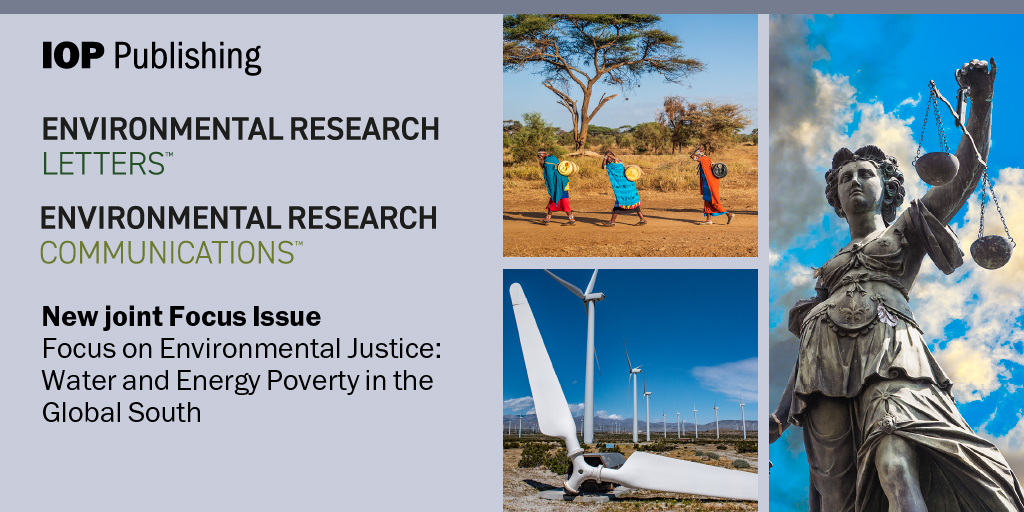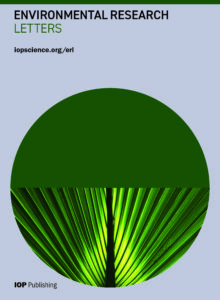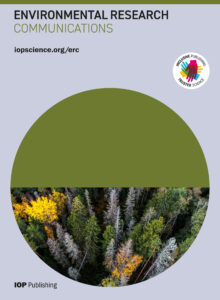ERL&ERC联合特刊精选|Focus on Environmental Justice

特刊详情
客座编辑
- Mark New,南非开普敦大学
- Nancy Karanja,肯尼亚内罗毕大学
- Nathan Williams,美国罗切斯特理工学院Golisano可持续发展研究所
- Margaret Skutsch,墨西哥国立自治大学
- Jennifer Burney,美国加利福尼亚大学圣迭戈分校
主题范围
In this focus collection, we welcome research from all aspects of water and energy poverty, as well as the related challenges of environmental justice. This scope includes technological innovation, policy and institutional challenges, business model development and financial sustainability, behavioural aspects of water and energy use, climate change and adaptation, and environmental justice. Specific topics of interest include but are not limited to:
- Impacts of access to water, sanitation, and energy on development
- Intertwined water and energy systems: water use for energy, energy use for water
- Justice and equity issues in water and energy provision
- Fundamental physical limits, including natural variability
- Water and energy system resilience
特刊文章
Jorge L Izar-Tenorio et al 2021 Environ. Res. Lett.16 104048
Matthew Shupler et al 2022 Environ. Res. Lett. 17 055012
Isa Ferrall et al 2022 Environ. Res. Commun. 4 055001
Imaduddin Ahmed et al 2022 Environ. Res. Commun. 4 085003
Drinking water accessibility typologies in low- and middle-income countries
Hichul Chung et al 2023 Environ. Res. Lett. 18 025009
Gender empowerment and energy access: evidence from seven countries
Maya Chandrasekaran et al 2023 Environ. Res. Lett. 18 045003
Cuthbert Taguta et al 2022 Environ. Res. Lett. 17 073003
Tackling climate risk to sustainably intensify smallholder maize farming systems in southern Africa
William C D Nelson et al 2022 Environ. Res. Lett. 17 075005
Bishal Bharadwaj et al 2022 Environ. Res. Commun. 4 101005
Mohammad Faiz Alam et al 2022 Environ. Res. Lett. 17 103003
Franziska Müller et al 2022 Environ. Res. Lett. 17 115006
Sustainability of fresh groundwater resources in fifteen major deltas around the world
J van Engelen et al 2022 Environ. Res. Lett. 17 125001
期刊介绍

- 2022年影响因子:6.7 Citescore: 10.1
- Environmental Research Letters(ERL)以金色开放获取模式出版,作者可选择将原始数据作为补充资料与文章一起发表。所有研究人员可以免费获取这些研究成果。ERL汇聚了关注环境变化及其应对的研究团体和政策制定团体的意见,涵盖了环境科学的所有方面,出版研究快报、综述文章、观点和社论。ERL顺应了环境科学的跨学科发表的趋势,反映了该领域相关的方法、工具和评估战略,得到了来自不同领域的广泛贡献。

- 2022年影响因子:2.9 Citescore: 3.6
- Environmental Research Communications(ERC)是一本开放获取期刊,涵盖与环境研究相关的所有领域,包括跨学科和多学科的研究。ERC发表推动该领域知识的所有研究结果,包括增量研究、负面结果、无效结果、案例分析、区域性研究和复制研究。
